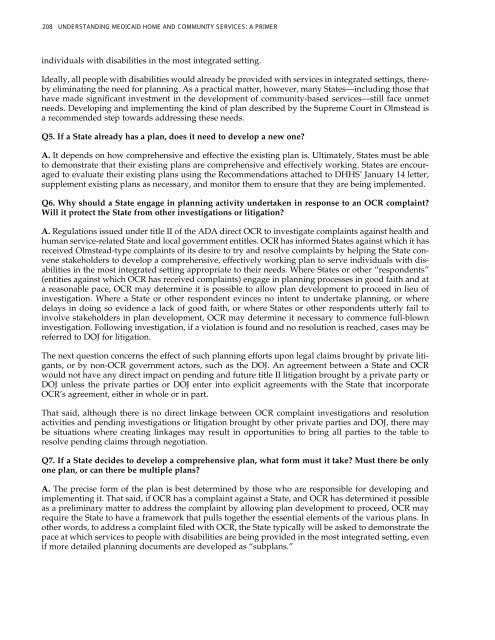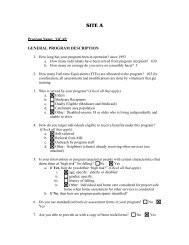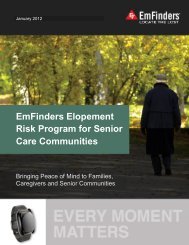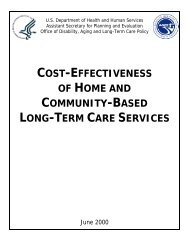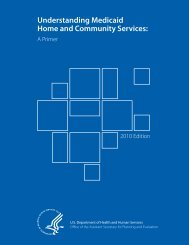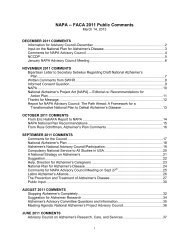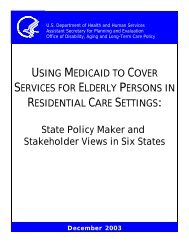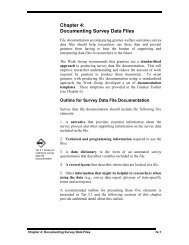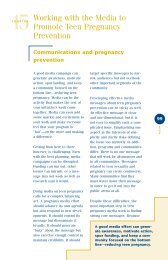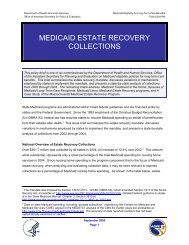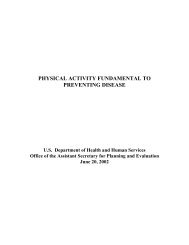Full PDF Version - ASPE - U.S. Department of Health and Human ...
Full PDF Version - ASPE - U.S. Department of Health and Human ...
Full PDF Version - ASPE - U.S. Department of Health and Human ...
- No tags were found...
You also want an ePaper? Increase the reach of your titles
YUMPU automatically turns print PDFs into web optimized ePapers that Google loves.
208 UNDERSTANDING MEDICAID HOME AND COMMUNITY SERVICES: A PRIMERindividuals with disabilities in the most integrated setting.Ideally, all people with disabilities would already be provided with services in integrated settings, therebyeliminating the need for planning. As a practical matter, however, many States—including those thathave made significant investment in the development <strong>of</strong> community-based services—still face unmetneeds. Developing <strong>and</strong> implementing the kind <strong>of</strong> plan described by the Supreme Court in Olmstead isa recommended step towards addressing these needs.Q5. If a State already has a plan, does it need to develop a new one?A. It depends on how comprehensive <strong>and</strong> effective the existing plan is. Ultimately, States must be ableto demonstrate that their existing plans are comprehensive <strong>and</strong> effectively working. States are encouragedto evaluate their existing plans using the Recommendations attached to DHHS’ January 14 letter,supplement existing plans as necessary, <strong>and</strong> monitor them to ensure that they are being implemented.Q6. Why should a State engage in planning activity undertaken in response to an OCR complaint?Will it protect the State from other investigations or litigation?A. Regulations issued under title II <strong>of</strong> the ADA direct OCR to investigate complaints against health <strong>and</strong>human service-related State <strong>and</strong> local government entitles. OCR has informed States against which it hasreceived Olmstead-type complaints <strong>of</strong> its desire to try <strong>and</strong> resolve complaints by helping the State convenestakeholders to develop a comprehensive, effectively working plan to serve individuals with disabilitiesin the most integrated setting appropriate to their needs. Where States or other “respondents”(entities against which OCR has received complaints) engage in planning processes in good faith <strong>and</strong> ata reasonable pace, OCR may determine it is possible to allow plan development to proceed in lieu <strong>of</strong>investigation. Where a State or other respondent evinces no intent to undertake planning, or wheredelays in doing so evidence a lack <strong>of</strong> good faith, or where States or other respondents utterly fail toinvolve stakeholders in plan development, OCR may determine it necessary to commence full-blowninvestigation. Following investigation, if a violation is found <strong>and</strong> no resolution is reached, cases may bereferred to DOJ for litigation.The next question concerns the effect <strong>of</strong> such planning efforts upon legal claims brought by private litigants,or by non-OCR government actors, such as the DOJ. An agreement between a State <strong>and</strong> OCRwould not have any direct impact on pending <strong>and</strong> future title II litigation brought by a private party orDOJ unless the private parties or DOJ enter into explicit agreements with the State that incorporateOCR’s agreement, either in whole or in part.That said, although there is no direct linkage between OCR complaint investigations <strong>and</strong> resolutionactivities <strong>and</strong> pending investigations or litigation brought by other private parties <strong>and</strong> DOJ, there maybe situations where creating linkages may result in opportunities to bring all parties to the table toresolve pending claims through negotiation.Q7. If a State decides to develop a comprehensive plan, what form must it take? Must there be onlyone plan, or can there be multiple plans?A. The precise form <strong>of</strong> the plan is best determined by those who are responsible for developing <strong>and</strong>implementing it. That said, if OCR has a complaint against a State, <strong>and</strong> OCR has determined it possibleas a preliminary matter to address the complaint by allowing plan development to proceed, OCR mayrequire the State to have a framework that pulls together the essential elements <strong>of</strong> the various plans. Inother words, to address a complaint filed with OCR, the State typically will be asked to demonstrate thepace at which services to people with disabilities are being provided in the most integrated setting, evenif more detailed planning documents are developed as “subplans.”


